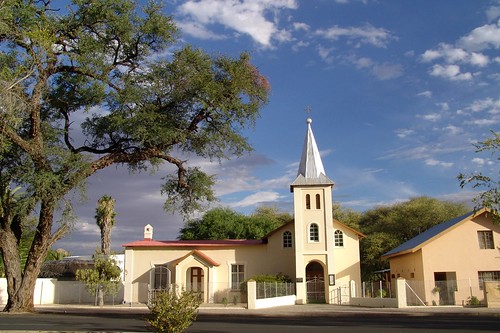Tsumeb
 It is odd to think that we have spent as much time here in Tsumeb as we have in almost any other place we have visited (others would be Amman, Asmara, Djibouti, Hargeisa and Addis) as that was certainly not the plan we arrived. As it turns out, we have come to appreciate this small town in the hiils of Northern Namibia, with its large green park, its wide streets bordered by beautiful flowering trees and shrubs – jacaranda, flame of the forest, bougainvillea, its pretty Protestant churches, its small but very interesting and well-presented museum, its row of shops, including the now famous Backerei Steinbach (we never did go back, as Fred did not fancy cockroach-infested Christmas cake or a milky (make that a milky one!) coffee), its now defunct copper mine, its arts and crafts centre, its ‘black’ township, its large white inhabitants, many with tree trunk legs and short shorts, its German biergartens and this odd charming little backpackers residence where we erected and decorated the Christmas tree yesterday evening.
It is odd to think that we have spent as much time here in Tsumeb as we have in almost any other place we have visited (others would be Amman, Asmara, Djibouti, Hargeisa and Addis) as that was certainly not the plan we arrived. As it turns out, we have come to appreciate this small town in the hiils of Northern Namibia, with its large green park, its wide streets bordered by beautiful flowering trees and shrubs – jacaranda, flame of the forest, bougainvillea, its pretty Protestant churches, its small but very interesting and well-presented museum, its row of shops, including the now famous Backerei Steinbach (we never did go back, as Fred did not fancy cockroach-infested Christmas cake or a milky (make that a milky one!) coffee), its now defunct copper mine, its arts and crafts centre, its ‘black’ township, its large white inhabitants, many with tree trunk legs and short shorts, its German biergartens and this odd charming little backpackers residence where we erected and decorated the Christmas tree yesterday evening.Its past has been dominated by the copper (and other metals) mine and its role in the First World War, where it was the centre of the short-lived German resistance to the Union forces of South Africa and Great Britain. But its main significance has been that of a mining town, for many housands of years, it would seem. The copper mines were worked and protected by the bushman (or San) for many an age, the product traded with other peoples. Imn addition to copper, there are deposits of many many interesting and beautifully coloured minerals (for which Tsumeb is apparently world famous to those with an interest inm semi-precious stones and gems) as well as other metals. More recently, Western/white exploitation of the metals was started 100 years ago, a fact celebrated in Tsumeb with a festival in late September. Ther was a hiccough a few years ago when the company owning the mine went bankrupt such that the mine in the town centre had to be closed. A new company eventually took over and started production again and is now doing very well thanks to the Chinese buying so much copper on the world markets!
The German history of Namibia, then known (and known by some whites here still) as South West Africa seemed to be a pretty normal story of Europeans in Africa except for one very nasty incident, this being the genocide of the Herero people. Apparently, the Germans cut off the Herero people from their sources of water such that many thousands of them died. At this very moment there are talks between Germany and Namibia about reparations for the Herero people. Joschke Fischer did acknowledge what had happened but did not go so far as to apologise. The German government seems willing to pay the money but their offer has been declined by the Namibian president.
Fred saw a book about this episode in a bookshop in Swakopmund, but it was to expensive so he did not buy it. He saw what he thought was this bookj in a cheaper version today and bought it, having been told by the shopkeeper that this was their best-selling book. Lying by the pool in the shade, he started reading it, only to find that it was in fact another book completely, namely a complete denial by some right-wing author of the events which everyone else accepts actually took place. Maybe he will leave it hear in the hands of someone who would appreciate this re-writing of history better..... and there will be many of them here.
One last point about Tsumeb. The air here is deliciously clear and clean and the colours of the trees are so bright in the light of the sun. Beautiful.
Tomorrow, we take a minibus to the capital Windhoek, then the night bus down to Cape Town, arriving Thursday evening, after a journey of 1,400 kms (actually closer to 2,000 kms), about the same as Amsterdam to Bologna (or Napoli!). We spend a few days over Christmas changing rooms everyday in a backpacker hostel in town before, possibly, taking the train another 1,800 kms up to Bloemfontein and across to Durban where we would hire a car for a two week journey back to Cape Town. That is the plan.
Labels: Namibia, Trip to Middle East and Africa




1 Comments:
jbvw80op1
golden goose outlet
golden goose outlet
golden goose outlet
golden goose outlet
golden goose outlet
golden goose outlet
golden goose outlet
golden goose outlet
supreme outlet
golden goose outlet
Post a Comment
<< Home